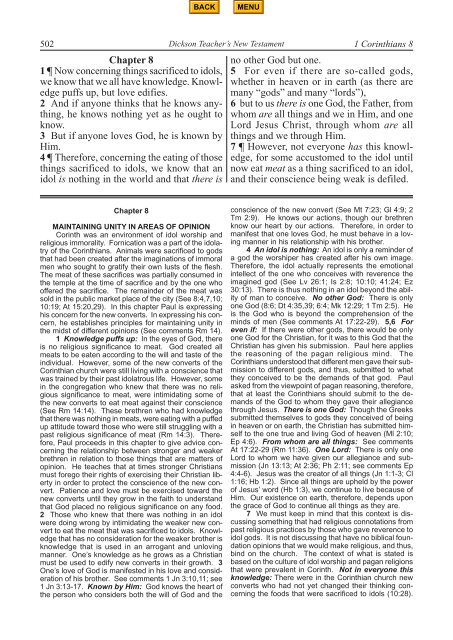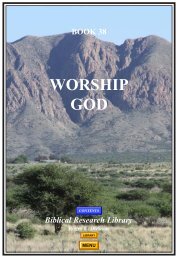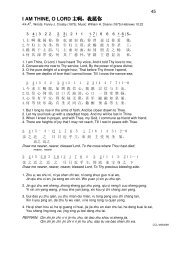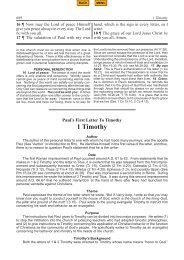1 Corinthians
1 Corinthians
1 Corinthians
Create successful ePaper yourself
Turn your PDF publications into a flip-book with our unique Google optimized e-Paper software.
502 Dickson Teacher’s New Testament<br />
Chapter 8<br />
1 Now concerning things sacrificed to idols,<br />
we know that we all have knowledge. Knowledge<br />
puffs up, but love edifies.<br />
2 And if anyone thinks that he knows anything,<br />
he knows nothing yet as he ought to<br />
know.<br />
3 But if anyone loves God, he is known by<br />
Him.<br />
4 Therefore, concerning the eating of those<br />
things sacrificed to idols, we know that an<br />
idol is nothing in the world and that there is<br />
1 <strong>Corinthians</strong> 8<br />
no other God but one.<br />
5 For even if there are so-called gods,<br />
whether in heaven or in earth (as there are<br />
many “gods” and many “lords”),<br />
6 but to us there is one God, the Father, from<br />
whom are all things and we in Him, and one<br />
Lord Jesus Christ, through whom are all<br />
things and we through Him.<br />
7 However, not everyone has this knowledge,<br />
for some accustomed to the idol until<br />
now eat meat as a thing sacrificed to an idol,<br />
and their conscience being weak is defiled.<br />
Chapter 8<br />
MAINTAINING UNITY IN AREAS OF OPINION<br />
Corinth was an environment of idol worship and<br />
religious immorality. Fornication was a part of the idolatry<br />
of the <strong>Corinthians</strong>. Animals were sacrificed to gods<br />
that had been created after the imaginations of immoral<br />
men who sought to gratify their own lusts of the flesh.<br />
The meat of these sacrifices was partially consumed in<br />
the temple at the time of sacrifice and by the one who<br />
offered the sacrifice. The remainder of the meat was<br />
sold in the public market place of the city (See 8:4,7,10;<br />
10:19; At 15:20,29). In this chapter Paul is expressing<br />
his concern for the new converts. In expressing his concern,<br />
he establishes principles for maintaining unity in<br />
the midst of different opinions (See comments Rm 14).<br />
1 Knowledge puffs up: In the eyes of God, there<br />
is no religious significance to meat. God created all<br />
meats to be eaten according to the will and taste of the<br />
individual. However, some of the new converts of the<br />
Corinthian church were still living with a conscience that<br />
was trained by their past idolatrous life. However, some<br />
in the congregation who knew that there was no religious<br />
significance to meat, were intimidating some of<br />
the new converts to eat meat against their conscience<br />
(See Rm 14:14). These brethren who had knowledge<br />
that there was nothing in meats, were eating with a puffed<br />
up attitude toward those who were still struggling with a<br />
past religious significance of meat (Rm 14:3). Therefore,<br />
Paul proceeds in this chapter to give advice concerning<br />
the relationship between stronger and weaker<br />
brethren in relation to those things that are matters of<br />
opinion. He teaches that at times stronger Christians<br />
must forego their rights of exercising their Christian liberty<br />
in order to protect the conscience of the new convert.<br />
Patience and love must be exercised toward the<br />
new converts until they grow in the faith to understand<br />
that God placed no religious significance on any food.<br />
2 Those who knew that there was nothing in an idol<br />
were doing wrong by intimidating the weaker new convert<br />
to eat the meat that was sacrificed to idols. Knowledge<br />
that has no consideration for the weaker brother is<br />
knowledge that is used in an arrogant and unloving<br />
manner. One’s knowledge as he grows as a Christian<br />
must be used to edify new converts in their growth. 3<br />
One’s love of God is manifested in his love and consideration<br />
of his brother. See comments 1 Jn 3:10,11; see<br />
1 Jn 3:13-17. Known by Him: God knows the heart of<br />
the person who considers both the will of God and the<br />
conscience of the new convert (See Mt 7:23; Gl 4:9; 2<br />
Tm 2:9). He knows our actions, though our brethren<br />
know our heart by our actions. Therefore, in order to<br />
manifest that one loves God, he must behave in a loving<br />
manner in his relationship with his brother.<br />
4 An idol is nothing: An idol is only a reminder of<br />
a god the worshiper has created after his own image.<br />
Therefore, the idol actually represents the emotional<br />
intellect of the one who conceives with reverence the<br />
imagined god (See Lv 26:1; Is 2:8; 10:10; 41:24; Ez<br />
30:13). There is thus nothing in an idol beyond the ability<br />
of man to conceive. No other God: There is only<br />
one God (8:6; Dt 4:35,39; 6:4; Mk 12:29; 1 Tm 2:5). He<br />
is the God who is beyond the comprehension of the<br />
minds of men (See comments At 17:22-29). 5,6 For<br />
even if: If there were other gods, there would be only<br />
one God for the Christian, for it was to this God that the<br />
Christian has given his submission. Paul here applies<br />
the reasoning of the pagan religious mind. The<br />
<strong>Corinthians</strong> understood that different men gave their submission<br />
to different gods, and thus, submitted to what<br />
they conceived to be the demands of that god. Paul<br />
asked from the viewpoint of pagan reasoning, therefore,<br />
that at least the <strong>Corinthians</strong> should submit to the demands<br />
of the God to whom they gave their allegiance<br />
through Jesus. There is one God: Though the Greeks<br />
submitted themselves to gods they conceived of being<br />
in heaven or on earth, the Christian has submitted himself<br />
to the one true and living God of heaven (Ml 2:10;<br />
Ep 4:6). From whom are all things: See comments<br />
At 17:22-29 (Rm 11:36). One Lord: There is only one<br />
Lord to whom we have given our allegiance and submission<br />
(Jn 13:13; At 2:36; Ph 2:11; see comments Ep<br />
4:4-6). Jesus was the creator of all things (Jn 1:1-3; Cl<br />
1:16; Hb 1:2). Since all things are upheld by the power<br />
of Jesus’ word (Hb 1:3), we continue to live because of<br />
Him. Our existence on earth, therefore, depends upon<br />
the grace of God to continue all things as they are.<br />
7 We must keep in mind that this context is discussing<br />
something that had religious connotations from<br />
past religious practices by those who gave reverence to<br />
idol gods. It is not discussing that have no biblical foundation<br />
opinions that we would make religious, and thus,<br />
bind on the church. The context of what is stated is<br />
based on the culture of idol worship and pagan religions<br />
that were prevalent in Corinth. Not in everyone this<br />
knowledge: There were in the Corinthian church new<br />
converts who had not yet changed their thinking concerning<br />
the foods that were sacrificed to idols (10:28).









